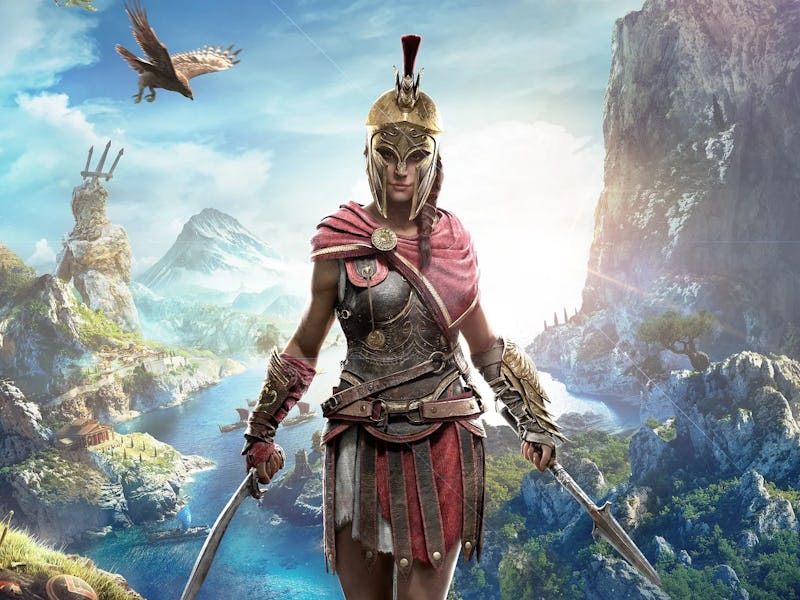5 Years Ago, Assassin’s Creed Took a Huge Risk — And Gave the Franchise the Fresh Start It Needed
Nothing is true.

Assassin’s Creed games have always shared a handful of defining core tenets: a focus on stealth, drawing on rich real-world history, and the central conflict between Assassins and Templars. But in 2018, the franchise threw out the playbook — and was better for it. The result was a game that doubled down on the vision established one year earlier, opting for an expansive open-world RPG that doesn’t care about all the convoluted lore the series has worked up.
Assassin’s Creed Odyssey takes place in ancient Greece, during the height of the Peloponnesian conflict between Sparta and Athens. Immediately, the role-playing focus is apparent as Odyssey is the first game in the franchise to let you choose the gender of your main character, playing as a spartan mercenary named either Alexios or Kassandra. The latter is one of the best protagonists the series has ever seen, with strong writing and a fantastic voice performance by Melissanthi Mahut lending a witty roguish charm to Kassandra, whose personality fits the game’s whimsical elements. By comparison, Alexios is more stoic, which can result in some of his story sections feeling flatter. There’s a sense of humor that Alexios’ character simply isn’t as good at conveying as Kassandra.
Odyssey’s recreation of ancient Greece is still jaw-droppingly gorgeous, and the most colorful setting the series has ever seen.
As you start your journey as a mercenary, Alexios or Kassandra will find themselves embroiled in the heart of the conflict and in a struggle against the Cult of Kosmos, which wants absolute control over the region. Odyssey puts a huge emphasis on its historical storytelling, even more so than past Assassin’s Creed games. Greek mythology and prominent figures from the time period, like Socrates, Leonidas, and Pythagoras, all play a central role.
That emphasis helps Odyssey feel more focused than other entries as it weaves a compelling tale through ancient history. As you might expect from the title, this is an epic tale in the spirit of Homer’s “The Odyssey,” and grounding the plot in larger-than-life characters is what makes the narrative truly shine. Dropping all the baggage of the series’ lore also lets you revel in the experience of taking a virtual road trip through a jaw-droppingly gorgeous recreation of the Grecian islands.
Odyssey ditches the lore of the series for a larger focus on historical storytelling, and it makes great use of prominent figures of the time.
Open-world games have a reputation for being long, but Assassin’s Creed Odyssey puts many of the genre to shame with the sheer breadth of things to see and do. Odyssey manages to hit that sweet spot of exploration, where you’re liberally rewarded for straying off the beaten path. At the same time, you can get away with largely just doing the main story, if that’s what you want. There are times when you might need to do a few side quests to grab some experience, but by and large, the game does a good job of never gating your progress.
A bigger focus on exploration and player choice then translates over to the rest of the game’s core systems, like combat. Whereas past titles put an emphasis on stealth, Odyssey opens up the floodgates to a wealth of different playstyles. If you want to opt for stealth still, that’s valid, but if you want to play it as a straight action-RPG, that’s fair game, too.
Where Odyssey really shines, though, is in its creation of a compelling world filled with meaningful sidequests and small stories. It’s clear that Ubisoft took a bit of inspiration from The Witcher 3, which packs plot details in side missions, as you often stumble upon a compelling personal story or features some kind of unique mechanic in the middle of a sidequest.
For example, one mission unceremoniously dumps you on an island to compete in a 100-man battle royale, while another has you hunting down a crime boss known as the Kingfisher, both eventually tying back into the Cult of Kosmos. Odyssey makes sure to dot its world with discoveries, whether that’s quests, new equipment, or even bits of lore. Just like with The Witcher 3, you’re consistently rewarded for whatever you choose to do in Odyssey, creating a sense of progression outside of simply furthering the plot.
The combat in Odyssey is much more action and skill-focused, which helps support the more open world design.
That sense of progression is exemplified by the Cult of Kosmos, the most interesting system in Odyssey that builds off of what Origins established. To find cult leaders, you’ll need to uncover clues, which can pop up during main quests while taking down strongholds, or by taking down other leaders. Again, this ties into an overarching sense of progression that permeates every facet of Odyssey. Completing something like a stronghold doesn’t just give you an immediate tangible reward, it also gives a sense of furthering a larger system, affecting the game’s world in a broader sense. These systems help make Odyssey more dynamic and alive than past games, which can feel more static with pre-assigned objectives.
Odyssey honestly doesn’t feel like much of an Assassin’s Creed game, but that’s exactly why it’s so good. The game’s mechanics and systems work in concert with its exploration and narrative, putting the focus squarely on ancient Greece rather than some ethereal conflict that spans the ages. That tighter focus lets Assassin’s Creed Odyssey revel in simply being an engrossing open-world RPG, and if the series can learn anything from it five years later, maybe it’s time to leave the past behind.
Assassin’s Creed Odyssey is available on PS4, Xbox One, PC, and Nintendo Switch via the cloud.
This article was originally published on